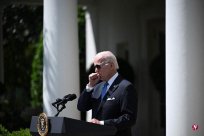After the Japanese Foreign Minister Lin Fang was holding a bilateral talks with US Secretary of State Brosky on Friday (July 29), he explained to the media that the two countries would strengthen cooperation in this regard.On the same day, the United States and Japan also held a two -plus second -level high -level economic dialogue in Washington to discuss how to counterattack China ’s impact and respond to the interference caused by the Russian and Ukraine War on the global economy.
(Washington Composite Electric) Japan and the United States agree to strengthen cooperation between allies and like -minded countries, and do not allow any unilateral action to try to change the status quo of the Pacific of India.
Japan Foreign Minister Lin Fangzheng held a bilateral talks with US Secretary of State Brills in Washington on Friday (July 29), and explained the above information to the media explaining the talks.On the same day, the United States and Japan also held a two -plus second -level high -level economic dialogue in Washington to discuss how to counterattack China ’s impact and respond to the interference caused by the Russian and Ukraine War on the global economy.
Lin Fang's speech at the Washington Think Tank Strategy and International Research Center (CSIS) pointed out that compared with international law, the "logic of brute force" has begun to become customary methods in this area.
Lin Fangzheng said: "The logic of brute force is becoming more and more popular. For the United States and Japan, the strategic balance of this area has formed a major challenge."
Lin Fangzheng pointed out that the international community should not allow Russia to invade Ukraine in other places. This war must end with the result of "obvious failure", otherwise other countries will try to change the status quo through force.
Lin Fang is avoiding the name of China in his speech, but he said that trying to change the status quo in the East China Sea and the South China Sea unilaterally in trying to unilaterally use force or coercion.He also said that the current US -Japan Alliance urgently needs to strengthen deterrence and counterattack capabilities. Japan has plans to greatly increase national defense and strengthen defense capabilities in five years, and it also requires the United States to expand nuclear military umbrellas to provide protection.
In response to the bombers of China -Russia in May this year, Lin Fangzheng said that China and Russia strengthening military coordination is being evolved into regional security issues."We are standing at the crossroads of history, full of sense of crisis ... We are at the moment of watershed."
The United States and Japan Agreement Cooperation Establishs the next -generation semiconductor joint research center
Minister of Economy and Industry, Nagata, also announced that the US -Japan Foreign Minister and Economic Minister of Economic and Minister of Economic Minister agreed to work together to establish a new next -generation semiconductor joint research center at the Second Canadian talks that day.
说 < The United States and Japan did not announce more details of the plan, but the Japanese Economic News revealed earlier that the Research Center was established at the end of this year in Japan to study two nanometer semiconductor chips.It will include a prototype production line, which is scheduled to begin production of semiconductor before 2025. The US Minister of Commerce Raymond said to reporters: "Semiconductor is the pillar of our economic and national security." She also said that officials have discussed the cooperation arrangements including advanced semiconductor. The United States and Japan Conference issued a joint statement saying that they will work together to "strengthen the elasticity of supply chain in the strategic field, especially semiconductors, batteries and important minerals." Brinton said at the talks that the United States and Japan are the world's first and third largest economies. The two countries work together to defend the rules -based economic order, so that all countries can participate, competition and prosperity. Brinken pointed out that major events in the world, including crown disease and the Russian and Ukraine War, have exposed the vulnerability of key supply chains, and more and more countries are facing debt burdens because of unsustainable and opaque borrowing practices.It is also an international issue that should be concerned.He even more clearly expressed China: "China's coercion and retaliatory economic practices have forced other countries to make choices that damage their own security, intellectual property and economic independence."


